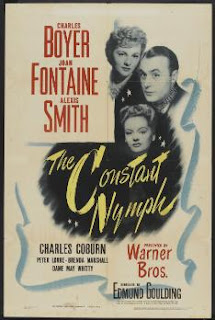The Constant Nymph
Joan Fontaine, whose centennial is this year, had three Academy Award nominations. Two of them are for films many film fans know--Rebecca and Suspicion. The third was for a film mostly forgotten now, The Constant Nymph, released in 1943.
The film is a typical '40s melodrama, set in the world of classical music. Charles Boyer plays a composer who goes to visit a mentor of his. The old man (Montagu Love) has four daughters, by different wives. The liveliest is Fontaine, always running from here to there, despite a weak heart (sharp chords). When the old man dies, some English relatives, including a cousin (Alexis Smith) take them in. Boyer, who has been told he doesn't feel emotions enough to be a great composer, falls in love with her and marries her.
This devastates Fontaine. We never really know how old she is supposed to be (Fontaine was about 25 at the time) but it seems like she is supposed to be a teenager. Therefore her love for Boyer is a little unseemly. He is more avuncular toward her than anything, but Smith gets jealous of her. Eventually Boyer realizes that Fontaine is his great love, but oops, too late!
The Constant Nymph is elegantly directed by Edmund Goulding, and based on a novel and play by Margaret Kennedy. She had enough power to have the film be only available to museums and colleges after its theatrical run, so the film was hardly seen for seventy years. Not that people were missing out on all that much. Boyer and Smith never seem like they're in love with each other, and as stated, the notion that Boyer and Fontaine would be a couple is uncomfortable in today's world.
Of note, Peter Lorre has a small part as one of the other sister's husbands. It's one of the few roles I've ever seen him in as a normal person. Charles Coburn is the girls' English uncle, and he's at his best British fusspots.
All in all, it seemed like a more modern update of Little Women. Four girls, one dies.
The film is a typical '40s melodrama, set in the world of classical music. Charles Boyer plays a composer who goes to visit a mentor of his. The old man (Montagu Love) has four daughters, by different wives. The liveliest is Fontaine, always running from here to there, despite a weak heart (sharp chords). When the old man dies, some English relatives, including a cousin (Alexis Smith) take them in. Boyer, who has been told he doesn't feel emotions enough to be a great composer, falls in love with her and marries her.
This devastates Fontaine. We never really know how old she is supposed to be (Fontaine was about 25 at the time) but it seems like she is supposed to be a teenager. Therefore her love for Boyer is a little unseemly. He is more avuncular toward her than anything, but Smith gets jealous of her. Eventually Boyer realizes that Fontaine is his great love, but oops, too late!
The Constant Nymph is elegantly directed by Edmund Goulding, and based on a novel and play by Margaret Kennedy. She had enough power to have the film be only available to museums and colleges after its theatrical run, so the film was hardly seen for seventy years. Not that people were missing out on all that much. Boyer and Smith never seem like they're in love with each other, and as stated, the notion that Boyer and Fontaine would be a couple is uncomfortable in today's world.
Of note, Peter Lorre has a small part as one of the other sister's husbands. It's one of the few roles I've ever seen him in as a normal person. Charles Coburn is the girls' English uncle, and he's at his best British fusspots.
All in all, it seemed like a more modern update of Little Women. Four girls, one dies.



Comments
Post a Comment